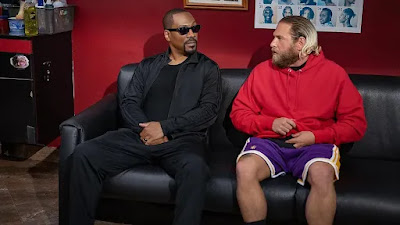Movies should more often be about beautiful people falling in love. It’s one of the most pleasurable plots cinema has to offer. When a movie can make you root for appealing celebrity performers twinkling with charm to finally get on the same wavelength to swoon and smooch, that’s a magic no effects can buy. I, like most who came of age cinematically in the 90s, have a particular affection for that era’s brand of romantic comedy artifice: high-gloss and high-concept, shot in big bright urban spaces and glamorously implausible apartments, and loaded up with reasonably clever banter and pop montages. When all of that is working at a decent clip, what more could you want? We don’t get that enough these days, especially in theaters where the comedy of any sort is a dying breed, and the rom-com leading the way out to the streaming services. That’s why last fall’s Ticket to Paradise was an oasis in this genre desert. How pleasant an afternoon to sit with an appreciative crowd and watch stars pantomime an inevitable slide in romance. Credit Netflix for trying to keep this sort of movie alive, I suppose, although a decent evening home is no substitute for the crowd when it’s a clear crowd-pleaser on screen. They have two new, prominent ones out now, and they each make for a good watch.
I had an amiable time with Your Place or Mine, the directorial debut of screenwriter Aline Brosh McKenna. She’s the voice behind The Devil Wears Prada and Morning Glory, so she knows her way around a charming studio movie of this scale. It stars genre vets Reese Witherspoon and Ashton Kutcher as longtime pals who once, in their younger years, might’ve been more than that. They live on opposite coasts, though, and therefore have an entirely call-and-text based friendship. Circumstances contrive to get them to swap houses for a week—he moving into her LA home to supervise her teenage son while she’s crashing in his New York apartment during a business trip. As with Sleepless in Seattle, it makes the most of the continental separation to stretch this romantic tension. But by keeping up their phone chats—in perfunctory split-screen that could’ve used a bit more Pillow Talk cleverness— while settled in the trappings of the other’s routine, they slowly and unknowingly edge back toward their earlier romantic possibilities. Witherspoon and Kutcher can crank up the charm in their voices, even as their eyes sparkle and they slide through the genre’s usual paces. The result is cute and sweet and full of the usual cast of supporting eccentrics of clever friends, oddball neighbors, and other potential partners (Tig Notaro, Steve Zahn, Rachel Bloom, Zoe Chao, Jesse Williams, and more). This is a soft and comfortable version of this sort of movie, with just enough charm to keep proceedings pleasant.
There’s a bit more superficial edge to Kenya Barris’s You People, but it comes around to a satisfyingly sickly sweet sentimentality in the end. It’s the feature debut of the prolific sitcom writer best known for Black-ish, and treads some similar water angling into modern race relations while brushing past class. Co-writer Jonah Hill stars as a Jewish podcaster who falls for a Black Muslim costume designer (Lauren London). Would you believe meeting the parents becomes a rolling social satire once the couple decides to get married? This Apatowian riff on Guess Who’s Coming to Dinner gets most of its comic energies here. Hill’s parents are cringingly well-meaning liberals who are so flop-sweat desperate to appear accepting that they circle all the way around to offensive. Played by Julia Louis-Dreyfus and David Duchovny, they are devastatingly awkward in scenes that stretch their niceties to clumsy outrages on the regular. Even better are London’s parents. Mother Nia Long side-eyes like a pro and jabs with cutting quips. Her father is Eddie Murphy, who can still take a so-so line of dialogue into the stratosphere of hilarity through nothing more than sheer charismatic commitment. In a supporting cast full of funny people (every role, down to the smallest is cast with amusing figures), he’s the biggest reason to see the movie. His constant testing of Hill is a fine, funny skewering, from needling the young man about the title of a rap song to backing him into blustering corners by pressing about the specifics of books it’s clear Hill hasn’t read. The whole thing builds to the mistaken breakups and inevitable apologies and the lovey reconciliation. (And a dance party over the credits, natch.) It errs on the side of sitcom styling, and is gilded with stylistic tics in scattershot establishing shots, but has an ear for honest stumbling conversations that erupt in big punchlines at a good, regular clip. I could imagine a packed theater crowd rolling with satisfied laughter, and maybe sniffling a bit at the finale.



No comments:
Post a Comment